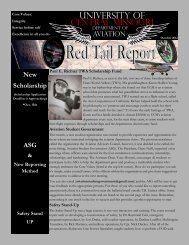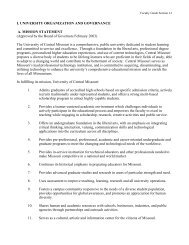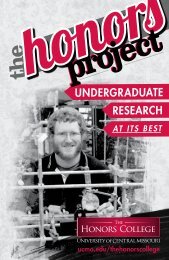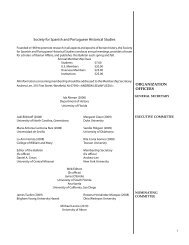s a publication for alumni and friends - University of Central Missouri
s a publication for alumni and friends - University of Central Missouri
s a publication for alumni and friends - University of Central Missouri
Create successful ePaper yourself
Turn your PDF publications into a flip-book with our unique Google optimized e-Paper software.
campus today<br />
Lost Boy <strong>of</strong> Sudan Survives War, Crocodiles,<br />
Finds Welcoming Home at <strong>Central</strong> <strong>Missouri</strong><br />
Orphaned by a brutal civil<br />
war when he was only nine years<br />
old, Daniel Lazaro has overcome<br />
extraordinary strife on his way<br />
to finding a new home in the<br />
United States. From the slaughter<br />
<strong>of</strong> people in his small Sudanese<br />
village to a life-threatening<br />
1,000-mile trek, barefoot <strong>and</strong><br />
<strong>of</strong>ten alone though jungle <strong>and</strong><br />
desert, he is one<br />
<strong>of</strong> thous<strong>and</strong>s <strong>of</strong><br />
young men known<br />
worldwide as<br />
the “Lost Boys <strong>of</strong><br />
Sudan.”<br />
Lazaro came to<br />
<strong>Central</strong> <strong>Missouri</strong><br />
State <strong>University</strong><br />
from Kansas City<br />
this fall to begin<br />
studying toward<br />
a degree in either<br />
computer science<br />
or aviation technology. He hopes<br />
to return eventually to southern<br />
Sudan as an American citizen to<br />
provide a helping h<strong>and</strong> <strong>for</strong> people<br />
he says continue to face political<br />
unrest, severe poverty <strong>and</strong> disease.<br />
“There is peace, but it is not<br />
like people think it is,” he said,<br />
still struggling with his English<br />
speaking skills. “There are no<br />
jobs. They need clean water <strong>and</strong><br />
medical clinics.”<br />
This is despite a historic<br />
peace treaty signed earlier this<br />
year between the Sudanese<br />
government <strong>and</strong> a rebel army<br />
in the south. The treaty ended a<br />
long-st<strong>and</strong>ing war that began in<br />
1983, pitting the country’s Arab<br />
<strong>and</strong> Muslim northern government<br />
largely against Christians <strong>and</strong><br />
black tribes in the south.<br />
Lazaro’s exodus from Sudan<br />
came in 1987 as northern soldiers<br />
began to move out <strong>of</strong> the larger<br />
communities <strong>and</strong> into places<br />
like Duk, a small rural village<br />
where he <strong>and</strong> his family lived.<br />
The soldiers shot <strong>and</strong> killed men<br />
<strong>and</strong> older boys <strong>and</strong> took away the<br />
young girls <strong>and</strong> women. Lazaro<br />
fled <strong>for</strong> his life.<br />
His extraordinary journey<br />
across Africa took him on foot to<br />
a refugee camp in Ethiopia, back<br />
to Sudan, then to the Kakuma<br />
refugee camp in Kenya. His<br />
From Warrensburg to<br />
Washington, D.C., is<br />
1,045 miles — that’s<br />
roughly the distance<br />
Daniel Lazaro walked<br />
as a nine-year-old<br />
boy, barefoot, with no<br />
water or food, through<br />
jungles <strong>and</strong> deserts.<br />
<strong>for</strong>mal education began there<br />
in 1992 while living amongst<br />
some 65,000 refugees from seven<br />
African nations.<br />
He’s one <strong>of</strong> an estimated<br />
11,000 young men who became<br />
known as the “lost boys” because<br />
<strong>of</strong> the way they had to fend <strong>for</strong><br />
themselves without assistance<br />
from their parents or elders, many<br />
<strong>of</strong> whom were killed.<br />
Lazaro shares his story<br />
<strong>of</strong> determination<br />
<strong>and</strong> how he b<strong>and</strong>ed<br />
together with other<br />
lost boys in an essay<br />
he wrote as a TRIO<br />
program student in<br />
CMSU’s Department <strong>of</strong><br />
Academic Enrichment.<br />
In that work<br />
he recalls his first<br />
encounter with five<br />
other young orphans<br />
he saw hiding in trees after he<br />
spent the first three weeks alone<br />
traveling at night to avoid gunfire<br />
<strong>and</strong> wild animals. All <strong>of</strong> the boys<br />
were on the way to Ethiopia.<br />
“Even though I did not<br />
know their names, we started<br />
introducing ourselves to each<br />
other as brothers. We joined<br />
<strong>and</strong> walked together <strong>for</strong> one<br />
month, taking care <strong>of</strong> each<br />
other until two guys had passed<br />
away.” One boy died <strong>of</strong> a snake<br />
bite, another <strong>of</strong> hunger. Those<br />
who remained <strong>for</strong>ged ahead<br />
in search <strong>of</strong> a safe haven.<br />
“We did not have any food,<br />
water, or even clothes <strong>and</strong> shoes,”<br />
he adds. “We just ate the leaves <strong>of</strong><br />
trees or mud <strong>and</strong> drank urine to<br />
keep us alive. We started finding<br />
the dead bodies <strong>of</strong> other boys <strong>for</strong><br />
many reasons: scorpion stings,<br />
poisonous trees, <strong>and</strong> no water,<br />
not even wet mud in the area. The<br />
place was desert with few trees.”<br />
Although he found refuge in<br />
Ethiopia after three months, he<br />
<strong>and</strong> other Sudanese lost boys were<br />
<strong>for</strong>ced to flee this country three<br />
years later when civil war broke<br />
out. Chased out by rebel troops,<br />
thous<strong>and</strong>s <strong>of</strong> young men died at<br />
the River Gilo on their way back<br />
to Sudan. Many drowned in the<br />
(continued to page 7)<br />
After surviving a harrowing trek across hundreds <strong>of</strong> miles <strong>of</strong> desert, an estimated 11,000<br />
“Lost Boys” found the protection <strong>of</strong> the United Nations. They crossed the Sudan border into<br />
Kenya <strong>and</strong> were taken to a Kakuma refugee camp, where they spent the next nine years<br />
waiting <strong>for</strong> an end to their country’s civil war. — Photo by B. Press/UNHCR<br />
One <strong>of</strong> the “Lost Boys <strong>of</strong> Sudan,” Daniel Lazaro has conquered life’s toughest hurdles enroute<br />
to becoming a student at CMSU this fall.<br />
page 6 central today<br />
winter 2005

















